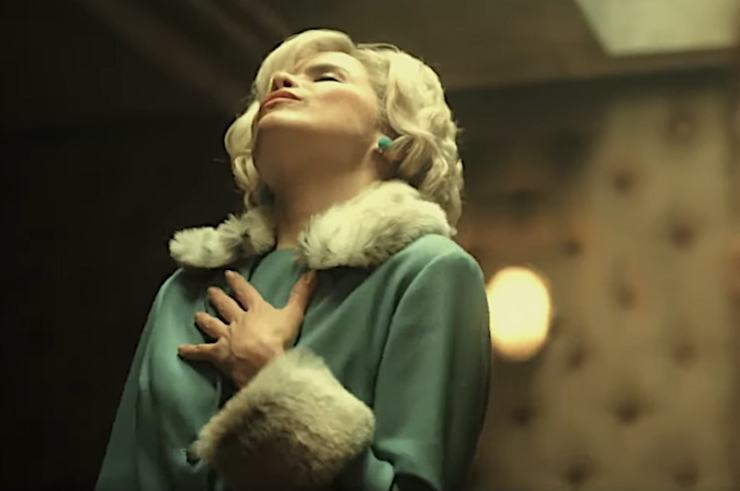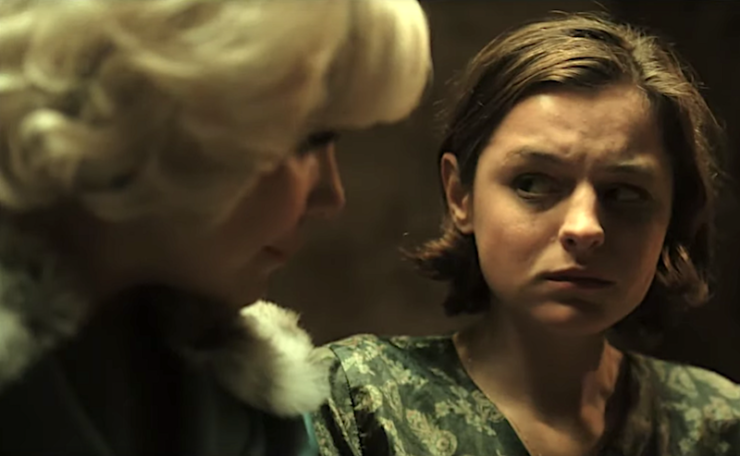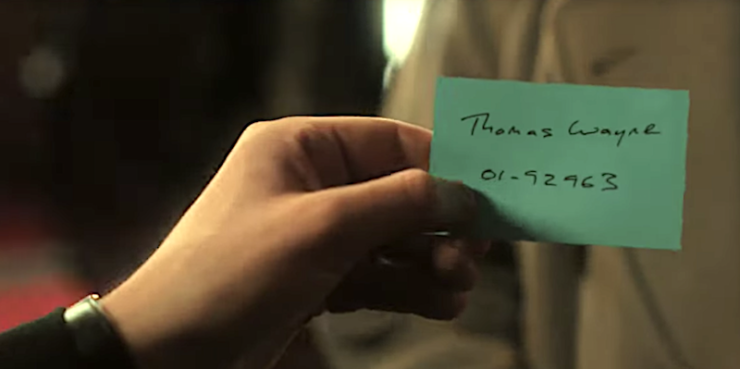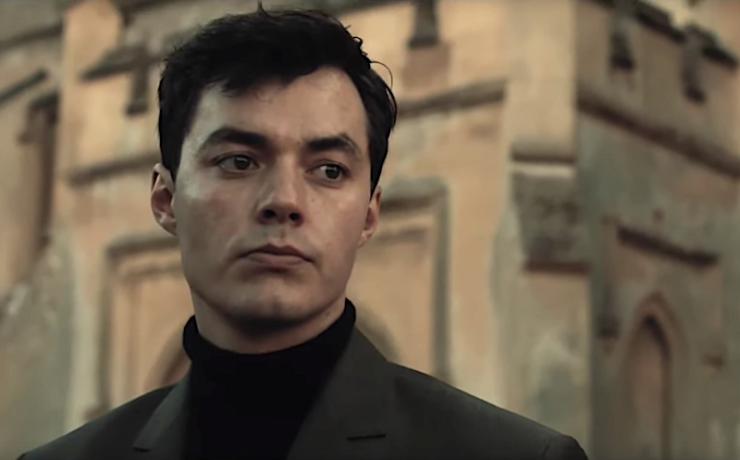I want to be fully onboard with Pennyworth because it is, in the parlance of our times, batshit. Sometimes the erratic, overstuffed plot works beautifully, as when young Alfred Pennyworth earns his pay with some troublesome night club ruffians. Other times, as when young Alfred Pennyworth attempts to romance a Posh Girl, things are a bit bumpier. But even then, there are dirigibles floating over London? There are shadowy conspiracies afoot? There is a chance meeting with a certain gentleman named Wayne?
Overall, if you like Gotham, you like British spy stories, you like terrifying female villains, you just really like the Batman mythos a whole lot? You’ll find a lot to love in Pennyworth, and so much insanity that even the stuff that doesn’t quite work goes down like a skillfully-shaken martini.
The idea of not just giving Alfred a backstory, but fleshing it out in the way the show is doing, kind of works? And if you’re going to bother giving this character a backstory it makes sense to do it in a way that matched Gotham’s own batshittery. And this makes sense because Pennyworth’s creator is Gotham showrunner Bruno Heller.
The pilot opens with a striking scene of a foxhunt set to the Rolling Stones’ “Paint it Black.” This is a breathtakingly efficient set up. Here is old Britain with its barbaric upper-class pastimes and disdain for the common folk; here is the most “dangerous” of the British Invasion rock bands, with one of their darkest hits. And in between them is the character of Alfred Pennyworth—his lower-class accent a conscious riff on Michael Caine’s from the Nolan Batman trilogy, his sharp suits a nod to style, his devotion to the Queen as old-school British as you could get, his devoted friendships—with Dave Boy, a (crazy) Scottish Army buddy (Ryan Fletcher) and Bazza, a (measured) Caribbean Army buddy (Hainsley Lloyd Bennett)—an indication of his progressive beliefs. The whole thing unfolds in a slightly-alterna-England, where dirigibles hover in the air beside St. Paul’s iconic dome, and hangings are broadcast on TV to deter crime.
Like I said, there’s a lot to like here.
Some of the action setpieces work beautifully, especially one in the nightclub where Alfred is a bouncer. The club itself is fun, since it seems to host burlesque and drag performances, all for a posh crowd who know to look the other way when a fight breaks out. Young Alfred is fresh from the British Army, where he was seemingly doing some very covert missions on orders from some very high authorities. He wants to start a new, quieter life by founding a security company, and wooing one of the dancers at the club.
Naturally this all goes awry when a shadowy conspiracy targets a guest at the club, and he gets pulled in to help.
The show nails a particularly fun ’60s London vibe. While Britain’s music and fashion are ruling Western pop culture, Alfred Pennyworth is a much lower-rent former soldier. His father’s a butler, his mum is a put-upon housewife. They have a small house on a nondescript street, and Alfred’s dad is only too quick to mock his son for trying to get above his station. The sets and locations are grungy—until we’re suddenly catapulted into an upper-class estate or a sleek mid-century apartment. The contrast between the world of the “haves” and the “don’t-even-think-about-havings” is jarring, and adds a little depth to the show.

The show’s villains are a fun mix: a coldly efficient older gentleman with a suitcase full of scalpels and dental tools, a chilling posh zealot who wants Britain to relive its racist, empirical past; and the best one, a terrifying lady named Bet Sykes in a platinum ’60s Dusty Springfield wig, who insists on calling her victims “duck” and “lamb”—which makes everything so much worse. As played by the singer Paloma Faith, who swan dives all the way into to her Singing ’60s role, I believed every second of her time on screen, and reader, I was scared to death of her. Another point in the show’s favor is that she seems to be the frontrunner to be a recurring villain, which will be a lot more fun and interesting that focusing on individual upper-class twits and shadowy battle between the right (Raven Society) and left (No-Name League)—two secret societies who agree that Britain has gone pear-shaped.
Jack Bannon starts off by doing a bloody fantastic Michael Caine impression as young Alfred Pennyworth. I admit I was giggling at him for a solid few minutes, but as the plot unspooled it felt more and more natural. Meeting Alfred’s parents helped, since they’re clearly at a particular spot on the class spectrum, and Pennyworth the Elder is clearly furious with his son for trying to “rise above his station.” We also learn that Alfred is a former SAS officer, which begins to make some other stuff clear—he’s gained a particular set of skills that have made him ideal for spy work, but that also means that he’ll have to jump class, or at least be able to fake a bunch of different classes, if he’s going to move through society and blend in. He also brings some gravitas to the role, particularly in a scene where he faces off with one of the older villains.

But I’d be an irresponsible pop culture critic indeed if I didn’t point out that the only queer character is not only a villain, but a really deeply crazy villain, whose craziness we’re meant to laugh at. And also a woman gets smacked around a whole bunch—and yes, sometimes, she fights back. But if I live the rest of my life without ever seeing another terrified girl whimpering as she’s tied to a chair I will die slightly happier than if I have to see it again. There is also some British Class Stuff that is handled clumsily. And I was not as impressed as I was meant to be by the action and hand-to-hand combat—after the third season of Daredevil and the third John Wick, I’m pretty hard to impress when it comes to action sequences.
The relationship between Alfred and Esmé, a dancer at the club, is also bumpy. Emma Corrin is great in the role (particularly a scene where she gives Alfred an impromptu acting lesson) it’s just that there are some painfully on the nose “we’re from different worlds, you and I” conversations between them—conversations that have already been had in every single British drama in every medium ever. This territory has been covered, with a lot more nuance than this show has time to give it, plus it forces the audience to be emotionally invested in a romance that’s all of 15 minutes old. Stronger is any scene where Alfred flirts with other people, and stronger yet is the scene where it’s implied that his feelings for the Queen might be more than ordinary British patriotism.
And then, well, let’s get to Wayne Enterprises-sized elephant in the room. Ben Aldridge is fantastic as Thomas Wayne, and has a perfect spark with Alfred. The idea of building the friendship between the two of them is the one reason I would ever want to re-litigate the events of Crime Alley. I’ve seen Batman’s origin story so many times at this point, but seeing Alfred’s shift from “friend/bodyguard/butler” to “grieving adoptive parent” might add some new depth to the story, especially to see how it builds on the zippy crime show the Pennyworth creators are giving us.

Pennyworth premieres July 28th on Epix.
Leah Schnelbach maybe just wants the Bet Sykes show? Also: more dirigibles! Come speak to her via the Bat-signal of Twitter!










